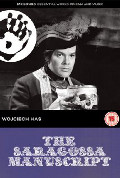
Directed by
Wojciech Has
147 minutes
Rated M
Reviewed by
Bernard Hemingway

The Saragossa Manuscript
Wojciech Has's The Saragossa Manuscript anticipated Alejandro Jodorowsky’s El Topo by a good seven years and for this is deserves some credit. During the LSD-enhanced 60s it gained a cult following but taken straight its "A Thousand and One Nights" style story-within-a-story-within-a-story that meanders this way and that and back on itself for two-and-a-half hours (the original Polish cut was 182m and it was shortened for US release) will today try most people’s patience severely.
Whilst it opens in the Napoleonic era when the titular tome is discovered in an abandoned farmhouse, the bulk of the story is set in a Don Quixote-ish Inquisition-era Spain where Alfons van Worden (Zbigniew Cybulski) plays a captain in the Walloon Guard trekking overland in search of the shortest route through the Sierra Morena to Madrid. Perhaps because of sun-stroke or an inadequate diet, before long Alfons is passed out and imagining all manner of weird and wonderful adventures, sometime involving him, sometime only the characters in his dreams/fantasies, in a series of stories which erase the distinction between imagination and reality.
The film is based on an early 19th-century novel by Jan Potocki who was indeed inspired by the above-mentioned series of fairytales. For its time it is a boldly adventurous film and one can understand it having a certain cachet in the hippie era for it certainly runs boldly counter to conventional narrative cinema and is invested with a certain ludic exuberance – both highly regarded as self-justifying qualities back then. Contemporaries Martin Scorsese and Francis Ford Coppola (along with The Grateful Dead's Jerry Garcia) were fans of the film and instrumental in it getting a DVD release in the 90s.
Whilst for most the will probably be at best a curio if you enjoy it then you should find equal if not greater satisfaction with Has’s similarly-styled but even more extravagant 1971 film The Hourglass Sanitorium.
Want something different?





